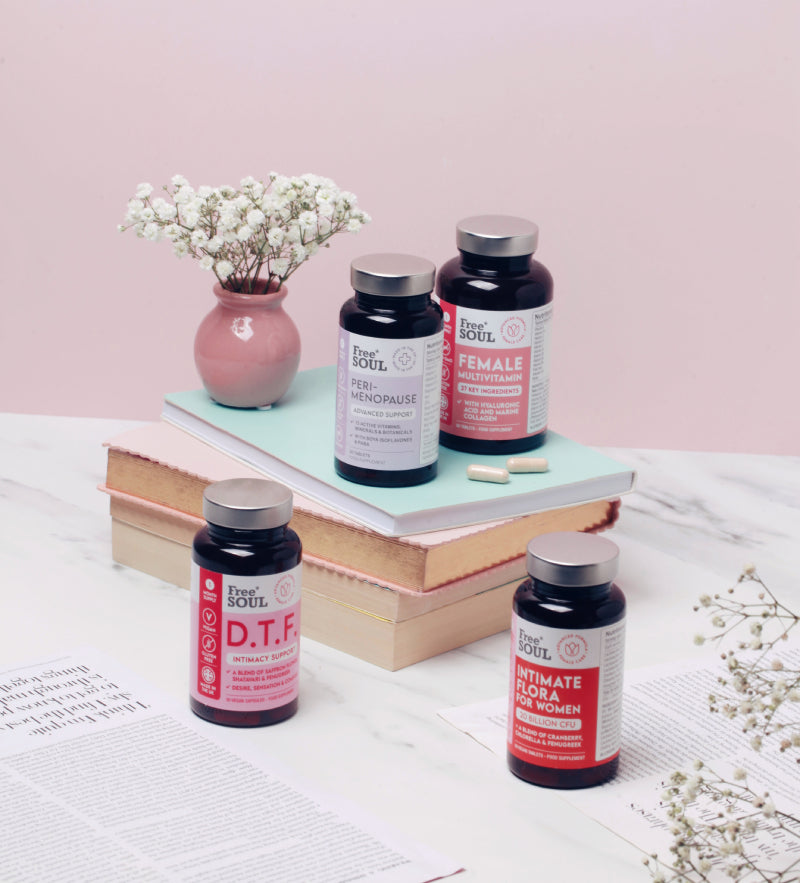Expert-Approved PCOS Diet & Lifestyle Tips!

Suffering from PCOS? You’re not alone. Affecting almost 20% of British females, PCOS is the most common hormonal condition among women of reproductive age.
Despite its prevalence, many women feel totally overwhelmed, isolated and misunderstood when navigating their diagnosis and managing their symptoms.
The good news is, there are ways to help manage and alleviate symptoms. Managing PCOS requires a multifaceted approach, including gut support, circadian rhythm support, diet, sleep, movement, stress management, emotional wellbeing and a positive mindset.
We’re breaking down how to get a handle on your diet, sleep and exercise…
Diet
Changing the way you eat is a big part of PCOS management, but it isn’t just about losing weight, many of the symptoms are a result of hormonal imbalances and these can be helped with a carefully tailored diet.
Opt for a diet rich in whole foods that are as natural and unprocessed as possible - ingredients such as fish, meat, vegetables, fruit, nuts and seeds are perfect. Pair these alongside foods with anti-inflammatory properties, like dark leafy greens, berries, grapes, beans, avocado and green tea.
Eating the right carbs
Every time you eat refined carbs, your blood glucose spikes, and with it, your insulin levels. So you’ll need to reduce or avoid these, as with the presence of your PCOS they will increase insulin levels and trigger the production of male sex hormones - in turn, triggering pretty much all PCOS symptoms.
Swapping out white carbs in favour of brown rice, oats, quinoa and buckwheat can make a noticeable difference.
Eating the right protein
Protein will help your body to stabilise blood glucose, reduce insulin and the male sex hormones, keep you feeling fuller for longer and put you in control of your appetite.
Opt for lots of plant-based protein sources like soya products, legumes, pulses, nuts, seeds and wholegrains (and your Free Soul Vegan Protein Powder, duh) opposed to animal products, which can promote insulin resistance and inflammation.
Carb cravings are commonly reported in women with PCOS, which could be linked to constant changes in blood glucose levels. Eating regular meals throughout the day can help to keep your blood sugar levels stable, whilst high fibre foods, protein and healthy fats can boost your feelings of satiety.
Sleep
PCOS can affect sleep, cause fatigue and trigger low mood. Exercise can help to reduce the hormones causing your fatigue, which in turn, will help you to feel better physically and emotionally.
On the days you feel exhausted, take it easy, and on those days when you have more energy, go for it. Listen to your body. Gentle movement is just as beneficial on those tired days as your more strenuous workouts on energised days.
To improve disturbed sleep, try simple things like having a warm bath in the evening and adding magnesium flakes; avoid sugary snacks before bedtime and steer clear of caffeine.
Exercise
Exercise is extremely important when it comes to conditions caused by hormone imbalances, but even more important is doing the right form of exercise. Exercise alone won’t cure PCOS, but it can help to manage symptoms.
High impact activities, such as running, can create extra cortisol in the body, worsening your PCOS symptoms. Moderate-intensity workouts (at least 30 minutes, three days a week) have been proven to reduce insulin resistance and aid weight loss.
Studies have shown that in people with PCOS, lifting weights can improve ovulation, reduce insulin resistance and promote weight loss as it lowers insulin and excess oestrogen and reduces testosterone.
Support with PCOS
P.S. If you’ve been diagnosed with PCOS, we know it’s a difficult and life-changing journey. We’re not only surrounded by women navigating their way through similar, confusing symptoms, we’re also here to help you too.
Plus, we’re working behind the scenes on something brand new, which we think will benefit you too. You’ll be one of the first to know when it’s here. Until then, we’re sending you lots of love and support.
**At Free Soul, your wellbeing is our priority, and although we pride ourselves on our expertise in women's health and wellbeing, it is important to acknowledge the individuality of each person. Features published by Free Soul are not intended to treat, diagnose, cure or prevent any disease, or replace the advice of your GP. We always recommend consulting with a healthcare provider if you encounter any health concerns, and we’ll always be here to support you so you’re never alone on your journey.













